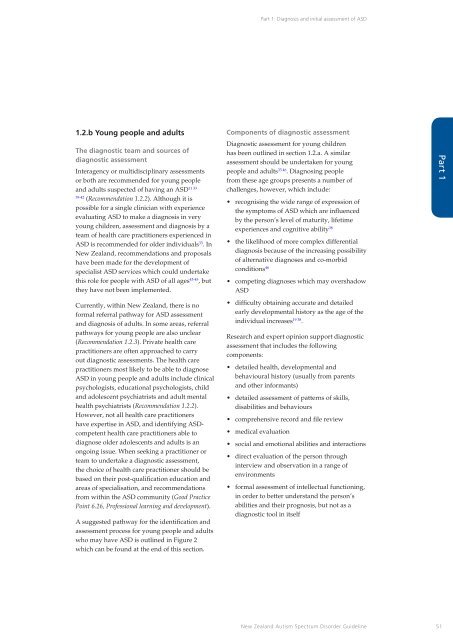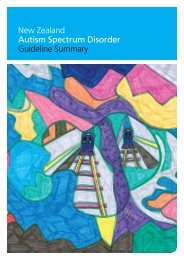New Zealand Autism Spectrum Disorder Guideline - Ministry of Health
New Zealand Autism Spectrum Disorder Guideline - Ministry of Health
New Zealand Autism Spectrum Disorder Guideline - Ministry of Health
You also want an ePaper? Increase the reach of your titles
YUMPU automatically turns print PDFs into web optimized ePapers that Google loves.
Part 1: Diagnosis and initial assessment <strong>of</strong> ASD<br />
1.2.b Young people and adults<br />
Components <strong>of</strong> diagnostic assessment<br />
The diagnostic team and sources <strong>of</strong><br />
diagnostic assessment<br />
Interagency or multidisciplinary assessments<br />
or both are recommended for young people<br />
11 33<br />
and adults suspected <strong>of</strong> having an ASD<br />
39-42<br />
(Recommendation 1.2.2). Although it is<br />
possible for a single clinician with experience<br />
evaluating ASD to make a diagnosis in very<br />
young children, assessment and diagnosis by a<br />
team <strong>of</strong> health care practitioners experienced in<br />
ASD is recommended for older individuals 33 . In<br />
<strong>New</strong> <strong>Zealand</strong>, recommendations and proposals<br />
have been made for the development <strong>of</strong><br />
specialist ASD services which could undertake<br />
this role for people with ASD <strong>of</strong> all ages 43-45 , but<br />
they have not been implemented.<br />
Diagnostic assessment for young children<br />
has been outlined in section 1.2.a. A similar<br />
assessment should be undertaken for young<br />
people and adults 33 46 . Diagnosing people<br />
from these age groups presents a number <strong>of</strong><br />
challenges, however, which include:<br />
• recognising the wide range <strong>of</strong> expression <strong>of</strong><br />
the symptoms <strong>of</strong> ASD which are influenced<br />
by the person’s level <strong>of</strong> maturity, lifetime<br />
experiences and cognitive ability 38<br />
• the likelihood <strong>of</strong> more complex differential<br />
diagnosis because <strong>of</strong> the increasing possibility<br />
<strong>of</strong> alternative diagnoses and co-morbid<br />
conditions 46<br />
• competing diagnoses which may overshadow<br />
ASD<br />
Part 1<br />
Currently, within <strong>New</strong> <strong>Zealand</strong>, there is no<br />
formal referral pathway for ASD assessment<br />
and diagnosis <strong>of</strong> adults. In some areas, referral<br />
pathways for young people are also unclear<br />
(Recommendation 1.2.3). Private health care<br />
practitioners are <strong>of</strong>ten approached to carry<br />
out diagnostic assessments. The health care<br />
practitioners most likely to be able to diagnose<br />
ASD in young people and adults include clinical<br />
psychologists, educational psychologists, child<br />
and adolescent psychiatrists and adult mental<br />
health psychiatrists (Recommendation 1.2.2).<br />
However, not all health care practitioners<br />
have expertise in ASD, and identifying ASDcompetent<br />
health care practitioners able to<br />
diagnose older adolescents and adults is an<br />
ongoing issue. When seeking a practitioner or<br />
team to undertake a diagnostic assessment,<br />
the choice <strong>of</strong> health care practitioner should be<br />
based on their post-qualification education and<br />
areas <strong>of</strong> specialisation, and recommendations<br />
from within the ASD community (Good Practice<br />
Point 6.26, Pr<strong>of</strong>essional learning and development).<br />
A suggested pathway for the identification and<br />
assessment process for young people and adults<br />
who may have ASD is outlined in Figure 2<br />
which can be found at the end <strong>of</strong> this section.<br />
• difficulty obtaining accurate and detailed<br />
early developmental history as the age <strong>of</strong> the<br />
individual increases 19 38 .<br />
Research and expert opinion support diagnostic<br />
assessment that includes the following<br />
components:<br />
• detailed health, developmental and<br />
behavioural history (usually from parents<br />
and other informants)<br />
• detailed assessment <strong>of</strong> patterns <strong>of</strong> skills,<br />
disabilities and behaviours<br />
• comprehensive record and file review<br />
• medical evaluation<br />
• social and emotional abilities and interactions<br />
• direct evaluation <strong>of</strong> the person through<br />
interview and observation in a range <strong>of</strong><br />
environments<br />
• formal assessment <strong>of</strong> intellectual functioning,<br />
in order to better understand the person’s<br />
abilities and their prognosis, but not as a<br />
diagnostic tool in itself<br />
<strong>New</strong> <strong>Zealand</strong> <strong>Autism</strong> <strong>Spectrum</strong> <strong>Disorder</strong> <strong>Guideline</strong> 51











